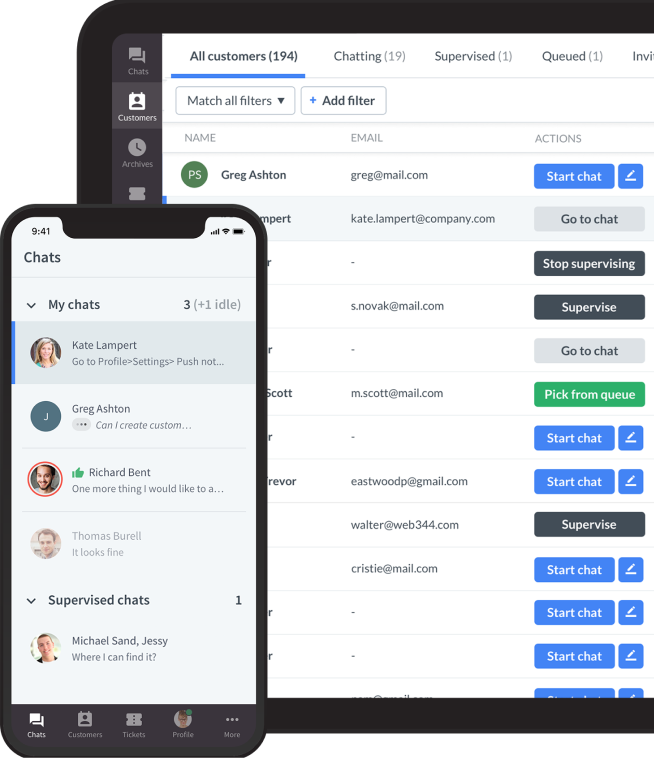Using Artificial Intelligence in Customer Support and LiveChat: Smart Tag Suggestions

Artificial Intelligence (or AI for short) has become quite the buzzword recently.
We're hearing how it's changing how we live, eliminating jobs, becoming creative, threatening our privacy, and so much more. Each day, a new app, SaaS product, or tool pops up, saying how it can automate this or that.
Let's be clear - these are amazing technological advances, and they're incredible ways to see that new technology put to use. AI can help us humans in many ways.
But AI in customer support - is it a thing yet?
We wanted to check if there is any way we could use artificial intelligence in LiveChat to improve it in any way. As it turns out, there are quite a few applications that can make the work of agents using LiveChat much easier and more efficient.
A couple of words about AI
The kind of AI we’re seeing cropping up in various software and IT projects is quite different from the one we know from sci-fi movies.
It’s still very far from a real AI that could grasp complex concepts. AI can't 'read' a human. It can't feel anything or express anything based on those feelings. Sure, it can't love, but it also can't read between the lines and understand that your customer is being passive-aggressive and, therefore, not happy.
But AI can learn and, in time, maybe resolve customer problems at scale.
What could your business do with technology like that?
You can teach a machine to recognize specific patterns or words in a message and suggest a relevant response. With this in mind, you could train your AI customer support to recognize specific words that imply something that's not being said and provide better customer support at scale.
This is just one of the use cases for AI in customer service.
How does AI learn?
You first need to feed a ton of information into it. For example, thousands of transcripts from past conversations between your customer service team and your customers.
After reading all your logs, the AI is expected to have made associations between what each party has said and be able to extrapolate that x usually leads to y.
But there's a difference between AI-powered customer service recognizing that X=Y. That's nothing more than reprogramming responses when specific answers are said. This is, in fact, what a wide range of chatbots do already.
The benefits of an AI customer service chatbot is that it's read thousands of past conversations and can answer questions that have never been asked before.
Using artificial intelligence in LiveChat
We wanted to try out this learning ability of the commercial AI technology in LiveChat to see if it can, in fact, create a better user experience or, at the very least, be used in customer service in a practical way.
Grzegorz Wyszyński, one of our Software Developers, came up with the idea to use AI to offer smart tag suggestions during chats.
Here’s a basic over view of how he sees us using AS in customer service:
Tagging chats lets you categorize the conversations you had with customers to get a better understanding of what’s happening on your LiveChat and to be able to easily find them later on. However, when a support agent is having several conversations at a time, it can be hard to pick the right tag for every chat.
To help with that, we wanted our AI to suggest tags automatically based on previous chat history. This way, LiveChat would suggest a ‘sales’ tag to a customer service representative whenever a sales chat comes up.
It works similarly to the way Google Inbox suggests short replies to emails automatically.
The AI learns how to tell different types of chats by checking previous chat history. The AI needs to see at least 100 tagged chats in the archives to offer suggestions. This is a fairly low threshold, but this allows more customers to be able to use it immediately. The more chats you have tagged, the more accurate the suggestions will be. It works for both the default LiveChat tags and the ones you’ve created, no matter which language you use.
We tried a couple of different AI models to make the project work: neural nets, support vector machine (SVM), and logistic regression. We ended up using SVM because it provided the most accurate results and required little computing power.
Results and plans for development
Currently, over 1000 businesses are using the automatic tag suggestion feature. It already provides some really great results, as over 42 percent of all tags assigned by agents using LiveChat come from automatic suggestions. This means that 7 percent of businesses using the feature are responsible for nearly half of all tags! It seems that automatic tag suggestion makes it much easier for agents to tag chats reliably and ultimately respond to customer queries more effectively.
The accuracy seems to be fairly high, even with licenses with a larger number of tags. Here's how it looks in numbers:
|
Number of tags |
Accuracy |
|
3 tags |
72% |
|
4 tags |
66% |
|
5 tags |
60% |
|
6 tags |
55% |
|
7 tags |
54% |
|
8 tags |
53% |
|
9 tags |
50% |
|
10 tags |
54% |
There are still some minor problems we need to iron out.
For example, the AI seems to have some difficulties with some languages, e.g., Hebrew.
However, the future of the project looks very bright.
Regarding our plans for the project's future, we’d also like to set up something similar for canned responses. We’d like to have a conversational AI that could automatically suggest canned responses to a support team, thus improving customer interaction.
However, that involves a whole other order of complexity. Moving from one-word tags to responses that include several paragraphs would require a lot more calculations and raw computing power.
We started working with a local University of Technology with an AI department to make that happen. They will use natural language processing (NLP) to determine if AI is feasible to suggest canned responses. And if it is, we will definitely want to include it in LiveChat.
If you want to try out the automatic tag suggestion yourself, you simply need to tag 100 chats. The option should appear automatically after a day or two after breaking the 100-tagged chats barrier.
There are some rare cases where the system can't provide accurate recommendations despite the 100 chats, but we'll do our best to make it more precise with future updates.
AI customer service chatbots
One of the most popular applications of AI in ecommerce is using chatbots to increase customer service effectiveness. In this situation, AI chatbots are trained to mimic human-like conversations with users and make the customer support process more efficient.
Customer service bots are available 24/7, meaning customers can get help at any time of the day. Customers that are impatient or prefer to shop outside of 'normal' hours can be on the end of superior customer service without a human being involved on your end. Additionally, chatbots can handle many customer queries simultaneously, making it possible to provide faster customer responses. This helps to improve customer satisfaction and reduce waiting times. An artificial intelligence system that interacts with many customers gives the AI more to learn from and helps create a better customer service experience.
Chatbots are also cost-effective for ecommerce stores. They reduce the need for human customer service representatives, thereby saving businesses money on salaries and other related costs. Chatbots can handle repetitive tasks, such as answering frequently asked questions, which frees up human representatives to focus on more complex queries that require human intervention.
AI-powered customer support can also provide personalized assistance to customers. Chatbots can use customer data to personalize their responses and provide relevant recommendations - but more on this later.
But despite the numerous benefits of using chatbots, there are still some challenges in using AI for customer support.
One major challenge is ensuring that chatbots provide accurate and relevant responses because chatbots used for customer service are only as good as the algorithms that power them. If the algorithms are not well-designed or trained, the chatbot may provide inaccurate or irrelevant responses, damaging the customer experience.
Another issue faced by automated customer service is trust. Customers may feel uneasy about interacting with a machine rather than a human representative. As discussed earlier, AI can't yet identify how a customer feels without them all but specifically stating it. Using machine learning to analyze customer sentiment can help, but there are times when a potential customer can only find the support they need in a human.
Lastly, chatbots can be limited in their ability to handle complex queries that require human intervention. While chatbots can handle most customer queries, there may be instances where a customer requires the assistance of someone with experience in that specific company. A business looking to leverage AI in customer service would be wise to set up processes where a support ticket is created when the conversation is heading toward needing a human touch.
Other AI customer service use cases
You saw earlier how we're using AI in customer service here at Live Chat to build a better user experience. AI can improve customer support and success in more ways than just a chatbot. Here are several other ways that AI tools can be used to create a better experience for customers:
Personalization
A personalized experience not only improves your conversion rate but can also make massive impacts on your LTV and AOV. AI solutions can be used to personalize the customer experience by analyzing customer data and behavior to identify individual preferences and needs. A personalized service can come in the form of tailored product recommendations, messaging, and promotions to each customer, increasing the likelihood of conversion and repeat business. AI can help companies build a better experience around their product or service, thus increasing the chances of repeat business and customer satisfaction.
Predictive analytics
One of the other ways to leverage AI is to analyze customer data to predict future behavior or needs. By learning to analyze customer data, a SaaS company could identify users who are at risk of churning. This can allow the company to proactively reach out to those users with targeted offers or support, improving retention rates. AI can also help identify customers that are likely to have a high NPS and become brand advocates, further helping you predict a user's behavior.
Sentiment analysis
AI can be used to analyze customer feedback, reviews, and social media posts to identify customer behavior and sentiment and identify areas for improvement. This can help customer service agents proactively address customer concerns and improve overall customer satisfaction.
Visual search
Artificial intelligence can enhance the search process on e-commerce sites with immeasurable SKUs or product pages. By uploading a picture from a competitor, or a photo they've taken themselves, AI technology can identify the best-suited product and show it to the customer. This can make it easier for customers to find what they are looking for and can improve the overall shopping experience. This lowers customer questions and improves customer self-service.
Fraud detection
With the help of AI, businesses can better detect and prevent fraud on ecommerce websites by analyzing user behavior and identifying suspicious activity. Machine learning algorithms can monitor user activity in real-time, identifying normal behavior patterns and flagging any deviations as potentially fraudulent. By constantly adapting to new tactics fraudsters use and using predictive analytics to identify high-risk users, AI can stay ahead of the game and prevent fraud before it happens. This can help protect the company and its customers from financial losses and reputational damage.
Wrapping up on AI for customer service
AI has become a powerful tool for improving customer support by creating better experiences and streamlining processes.
Chatbots, which can be trained to recognize patterns and suggest relevant responses are one popular medium in which we will no doubt see more AI exploration.
In the case of LiveChat, implementing an AI-powered automatic tag suggestion feature has improved the tagging process and customer support department for many businesses.
Looking forward, the future of AI in customer support is exciting and one we'll be embracing with open arms.
Get a glimpse into the future of business communication with digital natives.
Get the FREE report




